Originally published on Nintendo Castle.
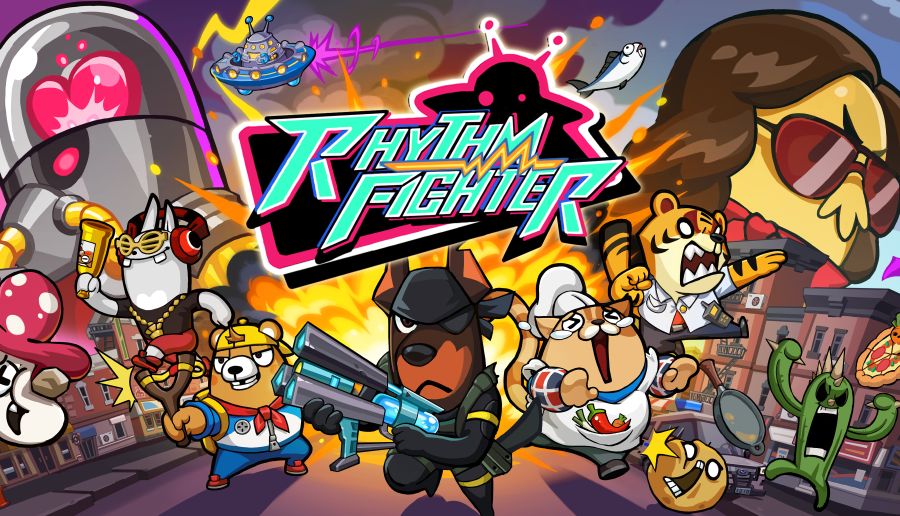
Rhythm-based roguelikes are a rare breed of video game, but since the release and success of Crypt of the Necrodancer, they are becoming more and more common. Rhythm Fighter is one of these games, and while the comparisons between this and Crypt of the Necrodancer are valid, they don’t give either game proper justice. Rhythm Fighter may be similar, but it’s definitely no pushover.
Platforms: PC, Switch [Reviewed]
Developer: Echo Games
Publisher: Coconut Island Games
Release: May 27, 2020 on Steam, January 14, 2021 on Switch
MSRP: $14.99
Press Copy provided by Coconut Island Games
Rhythm Fighter gives the player the ability to attack, move, roll, and use items all in tune with the beat of a background song. The songs are different based on the level, and their strength varies anywhere from genuine masterpieces of electronic music to pleasant background songs. In short, the music is fantastic and adds to the experience rather than taking away from it. The songs also change dynamically based on whether you’re in a shop, or are finished with all the enemies in a room.
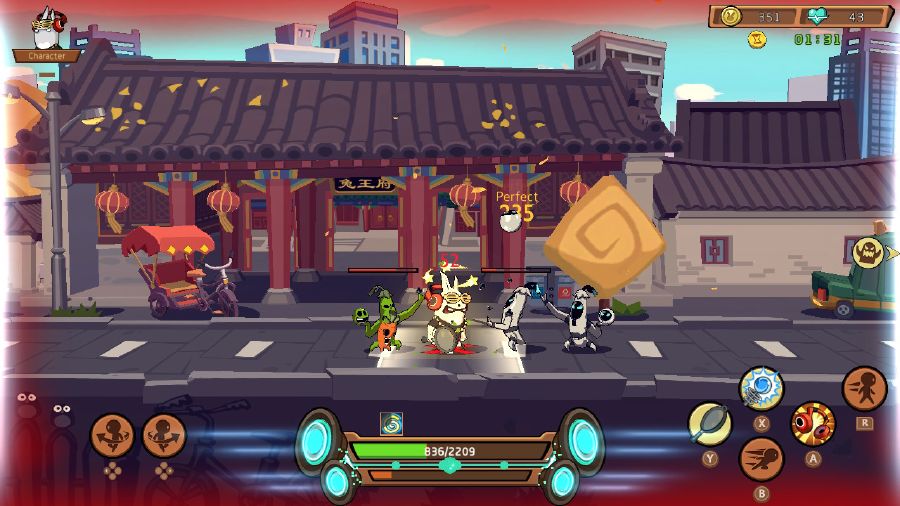
This system is far less intrusive than Crypt of the Necrodancer’s system, which both removes the disco lights on the ground and plays a heartbreaking sound upon a missed beat. Rather, in Rhythm Fighter, you are given very visual feedback as to your mistakes, with words above your character’s head showing you just how close to the beat you are.
This is a subtle change, but one that dramatically changes your mindset while playing. Rather than pointing out mistakes, the game rewards skillful play. For a roguelike, this is both rare and refreshing to see.
However, there is a downside to this, as sometimes it’s hard to notice when/how you lose health. Your health bar will disappear and you’ll be surprised when you look down and see yourself at 25% health. However, this isn’t nearly the biggest flaw the game has in its presentation.
While musically the game is nearly flawless, there are other ways that Rhythm Fighter distracts you from its experience. For one, the text is incredibly small, and while this isn’t an issue while you’re playing it on your Switch directly, when you switch to using it on a TV, it becomes almost unreadable.
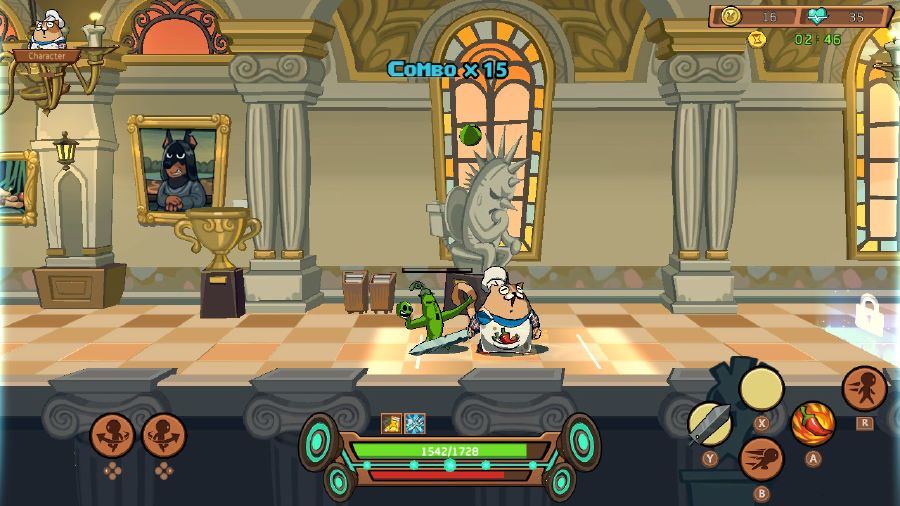
Secondly, the default controls on the Switch version and, I suspect, in other versions as well, are very difficult to handle for a newcomer. They are weird, incorporating the shoulder buttons in strange, distracting ways that detract from the experience if it’s your first time playing. But, even if it takes some getting used to, these controls allow you to pull off cool combos, roll away, and then do it all again quickly and easily. The controls are, in short, very difficult to learn, but easier than most other roguelikes to master.
In my time playing this game, I got better quickly and my improvement seemed constant, but rewarding at the same time. It’s a weird feeling to describe when a roguelike hits that level of progression well, but Rhythm Fighter definitely does. While some people look for steep learning curves and difficulty in their roguelikes, Rhythm Fighter provides a very easygoing but rewarding experience for the majority of players. This is definitely worth analyzing and celebrating.
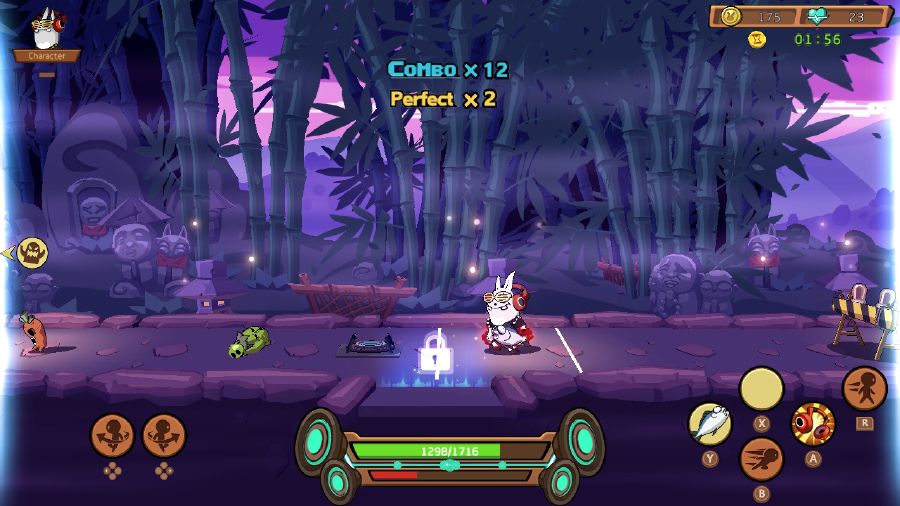
In addition to the rhythm-based elements of the game, Rhythm Fighter provides several innovations to the genre in the form of enemy-based minigames. For instance, a button-mashing minigame forces you to take a break from bobbing your head to the music and start slamming your thumb into the attack button. Another minigame forces you to time your attacks with the melody of the song rather than the beat. This requires you to listen to an entirely different section of the song than you’re used to. It catches you off guard for sure, but is also a welcome break from the mind-numbing rhythm of the beat.
These creative minigames are definitely a nice change of pace, and help break up the fun of the rhythm-based beat-em-up style gameplay that the game advertises.
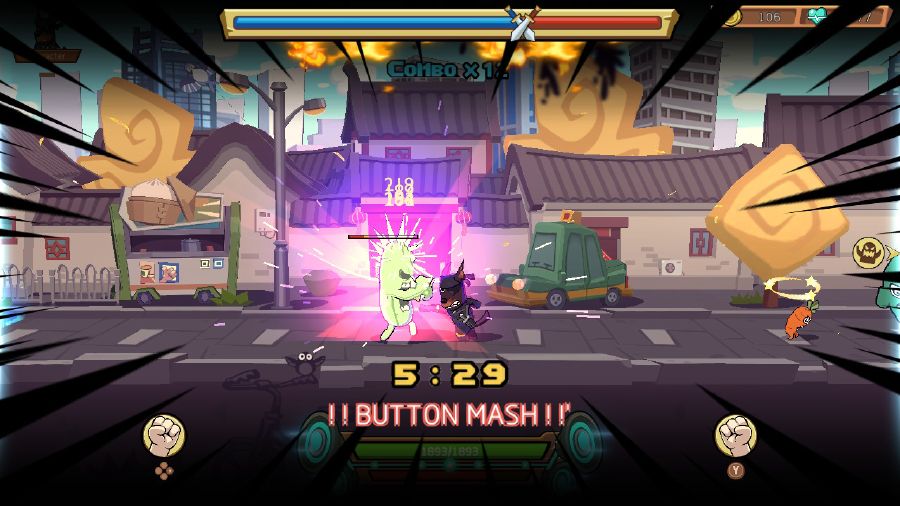
The bosses show both the best and worst of Rhythm Fighter. For one, they do not necessarily have to attack in time with the beat. This makes them challenging but also frustrating. But, they are also thematically creative, and a good way of showing your progress in the game. Even so, this does not really cover up the fact that they are playing a very different game than you are.
In general, the game succeeds at what it intends to do. There are a few flaws in gameplay, but overall Rhythm Fighter is a solid game that any fan of Crypt of the Necrodancer, or roguelikes in general, will really enjoy sinking their teeth into.
Pros:
- Excellent music
- Fun, rewarding gameplay
- Great feeling of progression and improvement
- Colorful, unique characters
- Great item and weapon variety and balance
- Unique art style
- Roguelike map layout and time challenges add a feeling of urgency to standard gameplay
Cons:
- Strange control decisions detract from gameplay
- Only one control scheme is usable with a controller
- Text is far too fast and small to be readable on a TV
- Bosses are frustrating, but rewarding
Verdict:
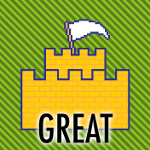
Great
Great games are generally good buying decisions and are recommended for those with an interest in the genre. There might be a few flaws that detract from the gameplay, stories, controls, presentations, or value, but the game is still an enjoyable experience that justifies a full playthrough.
Want to know what this score means? Check out our Scoring Guidelines page.